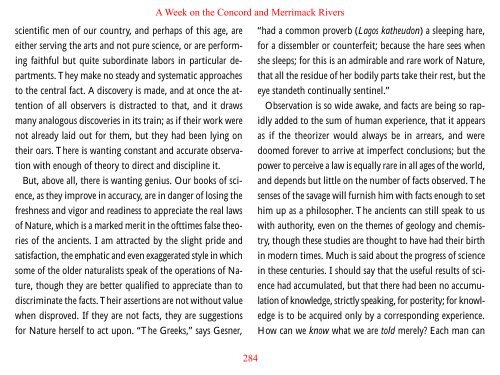A Week on the Concord and Merrimack Rivers - Pennsylvania State ...
A Week on the Concord and Merrimack Rivers - Pennsylvania State ...
A Week on the Concord and Merrimack Rivers - Pennsylvania State ...
Create successful ePaper yourself
Turn your PDF publications into a flip-book with our unique Google optimized e-Paper software.
scientific men of our country, <strong>and</strong> perhaps of this age, are<br />
ei<strong>the</strong>r serving <strong>the</strong> arts <strong>and</strong> not pure science, or are performing<br />
faithful but quite subordinate labors in particular departments.<br />
They make no steady <strong>and</strong> systematic approaches<br />
to <strong>the</strong> central fact. A discovery is made, <strong>and</strong> at <strong>on</strong>ce <strong>the</strong> attenti<strong>on</strong><br />
of all observers is distracted to that, <strong>and</strong> it draws<br />
many analogous discoveries in its train; as if <strong>the</strong>ir work were<br />
not already laid out for <strong>the</strong>m, but <strong>the</strong>y had been lying <strong>on</strong><br />
<strong>the</strong>ir oars. There is wanting c<strong>on</strong>stant <strong>and</strong> accurate observati<strong>on</strong><br />
with enough of <strong>the</strong>ory to direct <strong>and</strong> discipline it.<br />
But, above all, <strong>the</strong>re is wanting genius. Our books of science,<br />
as <strong>the</strong>y improve in accuracy, are in danger of losing <strong>the</strong><br />
freshness <strong>and</strong> vigor <strong>and</strong> readiness to appreciate <strong>the</strong> real laws<br />
of Nature, which is a marked merit in <strong>the</strong> ofttimes false <strong>the</strong>ories<br />
of <strong>the</strong> ancients. I am attracted by <strong>the</strong> slight pride <strong>and</strong><br />
satisfacti<strong>on</strong>, <strong>the</strong> emphatic <strong>and</strong> even exaggerated style in which<br />
some of <strong>the</strong> older naturalists speak of <strong>the</strong> operati<strong>on</strong>s of Nature,<br />
though <strong>the</strong>y are better qualified to appreciate than to<br />
discriminate <strong>the</strong> facts. Their asserti<strong>on</strong>s are not without value<br />
when disproved. If <strong>the</strong>y are not facts, <strong>the</strong>y are suggesti<strong>on</strong>s<br />
for Nature herself to act up<strong>on</strong>. “The Greeks,” says Gesner,<br />
A <str<strong>on</strong>g>Week</str<strong>on</strong>g> <strong>on</strong> <strong>the</strong> C<strong>on</strong>cord <strong>and</strong> <strong>Merrimack</strong> <strong>Rivers</strong><br />
284<br />
“had a comm<strong>on</strong> proverb (Lagos ka<strong>the</strong>ud<strong>on</strong>) a sleeping hare,<br />
for a dissembler or counterfeit; because <strong>the</strong> hare sees when<br />
she sleeps; for this is an admirable <strong>and</strong> rare work of Nature,<br />
that all <strong>the</strong> residue of her bodily parts take <strong>the</strong>ir rest, but <strong>the</strong><br />
eye st<strong>and</strong>eth c<strong>on</strong>tinually sentinel.”<br />
Observati<strong>on</strong> is so wide awake, <strong>and</strong> facts are being so rapidly<br />
added to <strong>the</strong> sum of human experience, that it appears<br />
as if <strong>the</strong> <strong>the</strong>orizer would always be in arrears, <strong>and</strong> were<br />
doomed forever to arrive at imperfect c<strong>on</strong>clusi<strong>on</strong>s; but <strong>the</strong><br />
power to perceive a law is equally rare in all ages of <strong>the</strong> world,<br />
<strong>and</strong> depends but little <strong>on</strong> <strong>the</strong> number of facts observed. The<br />
senses of <strong>the</strong> savage will furnish him with facts enough to set<br />
him up as a philosopher. The ancients can still speak to us<br />
with authority, even <strong>on</strong> <strong>the</strong> <strong>the</strong>mes of geology <strong>and</strong> chemistry,<br />
though <strong>the</strong>se studies are thought to have had <strong>the</strong>ir birth<br />
in modern times. Much is said about <strong>the</strong> progress of science<br />
in <strong>the</strong>se centuries. I should say that <strong>the</strong> useful results of science<br />
had accumulated, but that <strong>the</strong>re had been no accumulati<strong>on</strong><br />
of knowledge, strictly speaking, for posterity; for knowledge<br />
is to be acquired <strong>on</strong>ly by a corresp<strong>on</strong>ding experience.<br />
How can we know what we are told merely? Each man can

















